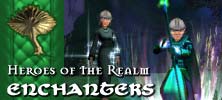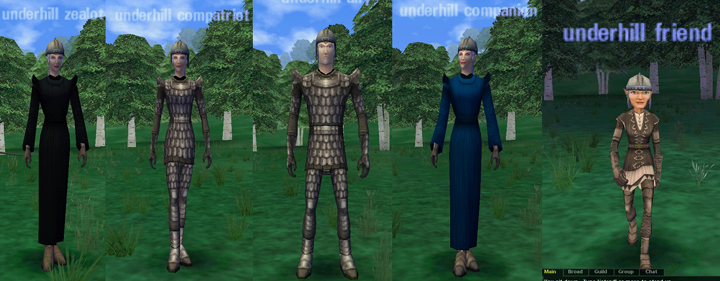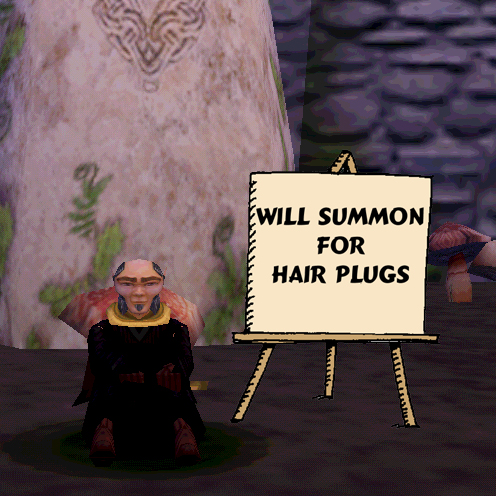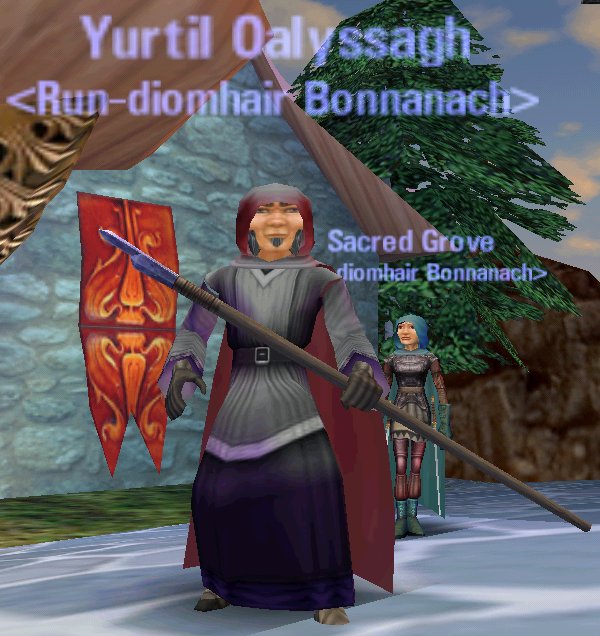 Lhotho's Enchanter Guide
Lhotho's Enchanter Guide

 Lhotho's Enchanter Guide
Lhotho's Enchanter Guide
Yes, the class is often vilified by many and in the hands of a skilled player can be devastating on both the PvE and RvR fronts. However, there is a skill required to achieve that level of proficiency and the average player will find the enchanter a solid, if not a little boring, class.
The enchanter is a pet class.
If you do not like playing a pet class, may I suggest an Eldritch?
Pet classes require that you control a type of �bot� to do your bidding.
You get your pets as you level. The new pets are always a baseline
spell, so you are sure to get each and every pet. Additionally, the
pet is always going to summon at 88% of your current level (TIP: Remember
to recast your pet when you gain a level. The pet will not automatically
level with you.).
The pets available
for use are:

5- Underhill Friend
This is a basic fighter
with no armor or other special abilities. It is a solid introductory
pet.
7- Underhill Companion
This pet is a spellcaster
with fewer hitpoints than the Friend. It casts a good heat-based
direct damage/snare spell.
12- Underhill Ally
This pet has some healing
ability and will cast a short duration hitpoint regeneration buff on all
group members and cast a heal group members when they fall below one quarter
health.
20- Underhill Compatriot
This pet is an advanced
fighter. It has good hitpoints and survives well in battle.
It casts a self only armor factor buff.
32- Underhill Zealot
The Zealot is a spellcaster
pet that also casts a self damage shield spell. This pet casts the
same spell as the Companion, and will also cast a cold-based DD/magic resistance
debuff spell. These spells will be cast at random.
Spells: 
The enchanter has 3 spell lines to choose to specialize in; Light, Mana, and Enchantment. One concept that you need to remember is the difference between baseline and specialization spells. You automatically get the baseline spells dependent on the level of the spell. You must specialize in the respective specialty to get spells in the specialty line. Things being equal, specialty spells will be more effective and more power efficient than baseline spells. Specialization also decreases the variability on the damage done by damage spells and healing done by healing spells. For instance, if you have 1 point in a specialty line, you will have a high degree of variability between casts of the same damage spell. However, if you put specialization points in that line, the variability will decrease around the maximum damage done by that spell.
Light Specialization:
Baseline
- Ranged DD Spell
- Stun
Specialization
(Bedazzling)
- Ranged DD Spell
- 3 (yes, count them) types
of Attack Speed Debuff
The light line is a good specialization for both solo and RvR play. The light enchanter is more of a primary nuker with a pet to delay and harass the enemy.
Mana Specialization:
Baseline
- AF Shield
- Damage Shield
- Absorption Buff
- Bladeturn
Specialization
(Empowerment)
- Point Blank Area Effect
DD Spell
- Focus Damage Shield (pet
only)
- Magic Resistance Debuff
(heat, cold, matter)
The mana line is very popular and revolves around the point blank spell (PBAE, discussed below) and the focus (the spellcaster cannot move, see solo tactics below) spell. The magic resistance debuffs allow you to remove any resistance (even below zero) to a type of damage. The light line is based on heat damage, so the heat debuff will maximize the utility of your baseline and specialty light spells (an overpowered feature IMHO and what leads to the bad reputation in RvR).
Enchantment Specialization:
Baseline
- Pet Summon
- Pet Heal Spell
- Group Run Speed Spell
Specialization
(Enchantment Mastery)
- STR/CON Pet Buff
- DEX/QUI Pet Buff
- Damage Add Buff
The enchantment line is the
least specialized line of all. The pet buffs do increase the life
of the pet, but they don�t do it at a rate that would offset the benefit
of the other two specialties. The most attractive spell in this line
is the damage add spell. This spell gives damage per second boost
to the weapon of anyone in the realm. The attraction of this specialization
is for this spell alone.
"Why am I wearing sunglasses? Erm...you've never grouped with a Mana Chanter before have you?"
Most enchanters over level
45 are constantly being asked if they are mana spec�d and if they want
to join a �Fin� group or some other such experience gaining endeavor.
The PBAE spell is unique in that it spreads the agro (aggressive behavior
of the PvE target) to every member of the group. Therefore, the spellcaster
rarely gets attacked, even when the spellcaster is standing in the middle
of battle. Most people think you are insane when you do this, but
when the group realizes that they can survive fighting 3 or 4 monsters
at a time, they droll at the prospect of more experience and can�t get
enough of the PBAE caster.
 The
following is from a type of guide by Aelhaeran of the Percival server:
The
following is from a type of guide by Aelhaeran of the Percival server:
Unlike the other 2 breeds which have some semblance of self preservation, the Thermo Strobe bolter has channeled all of its strength into the insanely dangerous point blank area of effect spell.
While wildly powerful, its primary means of attack requires it to wade into the midst of natural predators in order to be effective. This results in a dangerous mix of suicidal tendencies and homicidal rage. Despite having the most meager defense of any natural species, the Seizure Bolter will often burst from hiding and run screaming into packs of enemies in order to deliver its thermo nuclear payload. Often relying on his spells ability to tap into the goddam core of the Sun itself to daze and blind his opponents long enough to cast it more then once.
When not in combat,
the Thermo Bolter will prowl around, sometimes even solo, seeking large
packs of foes it can toss its life away at. It�s not unusual to see some
of these death bombs run headlong into siege parties or pressed up against
walls and doors searing the retinas of friend and foe alike.
The gods of soloing:
Enchanters are a great solo class. The experience that most enchanters get soloing rivals the experience they can gain from a mediocre group. This makes most enchanters very picky about the group that they are in and usually make them the first to leave when things start going south. The combination of a pet and good damage allows for safe leveling of �orange� conning creatures in most circumstances.
A popular tactic for mana
enchanters is to solo whole �camps� of �blue� conning creatures.
Here you rely on the aggressive nature of the monster and send your pet
into the camp while simultaneously casting your �focus� shield on the pet.
The focus shield does great damage to every creature hitting the pet.
You then set your pet to passive and the pet will come back to the enchanter.
At the same time, the creatures will stack one on top of each other.
When the pet is back, you set it back to defensive and cycle it through
the monsters setting it to attack whoever has the most hit points.
At a little over half health, you then break focus and walk into the middle
of that stack of monsters and rip off two or three PBAE spells, killing
everything in site. This is a high risk procedure, but done correctly,
can gain insane amounts of experience, and almost as important, loot.
Quickcasting:
Quickcast is a skill that
allows you to cast a spell in half the casting time and do so uninterrupted.
This skill is on a 30-second timer and uses double the power consumption
of a normal spell. Only use this skill as a last resort to finish off a
creature or cast a root/snare to extend the distance between you and the
enemy.
Agro Management:
Agroing a creature is when the creature decides that of all the people in the group, he really hates you to the point of attacking you. This is something you obviously DON'T want to happen. Creature's in general go after the guy who has inflicted the most damage per round of combat. There is an agro list and doing a lot of damage to the creature will move you up that list. If the person at the top of the list isn't the creature's current target there is a HIGH change the creature will switch to attack that person.
You DON'T want to be on the top of that list unless you have a lot of hit points and like receiving lots of damage (i.e., a fighter class). You avoid this by first letting someone else pull the creature back to the group. You also should wait until the primary fighter has hit the creature once or twice before you start casting at the creature. In a group, you should use lower damage spells and not you highest damage spells. By using lower damage spells you're first keeping yourself off the top of the agro list and second reduce your down time after the battle to recover power. The only exception is if, toward the end of battle, you can drop the creature with your last shot, or slow the creature enough so that it won�t get to you before the rest of the group kills it.
Another benefit is since you are conserving power if things start looking bad you can either break out the higher damage spells in an attempt to finish the creature off quickly before someone dies or use a holding spell to allow them to escape the creature and let the rest of the group finish the creature off. If you had dumped all your power early in the battle you would have most likely agroed the creature onto yourself leaving the group to try to save you life or not had the power when it was most needed.
One aspect of agro that isn�t well known is that proximity to the creature also increases a spellcaster�s level on the agro list. It is best to be close to maximum range in a group while casting your low to mid-level spells. If you do this, then you will only die if all others in your group die. The enchanter tries to maintain agro management by having the pet engage the creature. Remember, both spells and healing adds to the agro on the enchanter. This is a fine balance that must be learned and cannot be taught in a guide.
The best way to solo play
with a pet is to pull with a debuff, then �sick� the pet on the MOB. When
the pet hits the MOB, the MOB will start to melee with and aggro on the
pet. Then you should go to maximum range and start lobbing spells at the
MOB. Here the DoT spell works well, so do constant low dmg DD spells. The
key here is to NOT have the MOB lose interest in the pet. Pet healing spells
are very effective, but also cause the MOB to aggro on the spellcaster.
As a general rule, use the pet healing spell that is one lower than your
best and only start healing when the pet has done over 1/8 damage on the
MOB AND when the pet is lower than 2/3 health.
Pets take about 1/2 of the
experience of a like leveled character AND only take experience based on
the damage that they do. They also contribute only as half a character
with respect to the �Bring a Friend� code. Pets are very effective in groups
and do help with groups that are lacking in primary melee characters. However,
it must be remembered that most pets are at least 1-3 levels below the
spellcaster, therefore, most of the MOBs that it faces con orange to red
to it.
 Pulling - the art of luring a MOB out of a crowd:
Pulling - the art of luring a MOB out of a crowd:
Pulling is when you get a
MOB to come to you away from its camp so what when you fight the MOB, it
doesn�t call for help bringing a bunch of other MOB's into the fight. Pulling
as a Spellcaster is very tricky especially when you are fighting solo.
To succeed in a solo fight you need to do maximum damage possible before
the MOB get to melee range. To pull you need to do minimum damage to the
MOB until you are clear from the camp. That is the problem. As a Spellcaster
you want to cast your highest damage spell from the get go BUT if you do
you will have very good odds of the MOB calling for help while in the camp
bringing into the fight many more MOBs than you can handle. I've found
3 techniques that work well:
1) Don't pull in the 1st place
This is by far the best option. When in a group let a tank pull. They are better suited to the job then yourself. However, in many cases, the silly tanks don�t have a ranged pull and they often object to running and getting beat on as they run.
2) Use No damage spells
There are a few movement-reducing or debuff spells that each class gets. These all work well for pulling as they allow you to get the MOB to come after you and in many cases friends won�t come with them. The MOB will be agro on you until someone else does damage on it. At that point you can extend distance and start casting.
3) Use low damage spells
This is where you use a 1st
level spell to pull. Since it will do very little damage the MOB usually
won't call for help right away. You inch up to within casting distance
and hit it with a first level spell then turn tail and run. Spellcasters
need more distance between themselves and the camp than fighters do. The
MOB will now be absolutely agro on you until a tank or someone else does
damage enough on the MOB to erase your damage. This type of pulling is
usually a good way to die, unless you are pulling with another spellcaster.
In that case, you can �Ping Pong� your target with equal spells and hopefully
kill it before it decides who it hates more.
Pulling is an art. You need to be fearless and you cannot have hesitation. You must study and know what the camps are like and know how the MOB will react. It is better to run the MOB away on a bad pull than bring a bunch of death back to your group.
Your Epic Gear:
So you've made it to level 50 and you want to stand out as a target for all to kill, how spiffy is that?


Realm vs Realm:
Enchanters are very solid
in group RvR. Solo, they tend to fall hard. Tyfud, one of the
greatest enchanters in the game, made THIS guide
for dealing with Stealthers. Not to be outdone, another great
enchanter, Lilalis, composed an alternate guide
for dealing with stealthers. Both apply to the class.
Fin
Thank you for taking the time to read this guide. I hope it was of some use. I have setup an enchanter forum for your posting and information needs. Please register. You can post in the public forum after registration. If you behave yourself, I will also grant you access to a private enchanter forum as well.